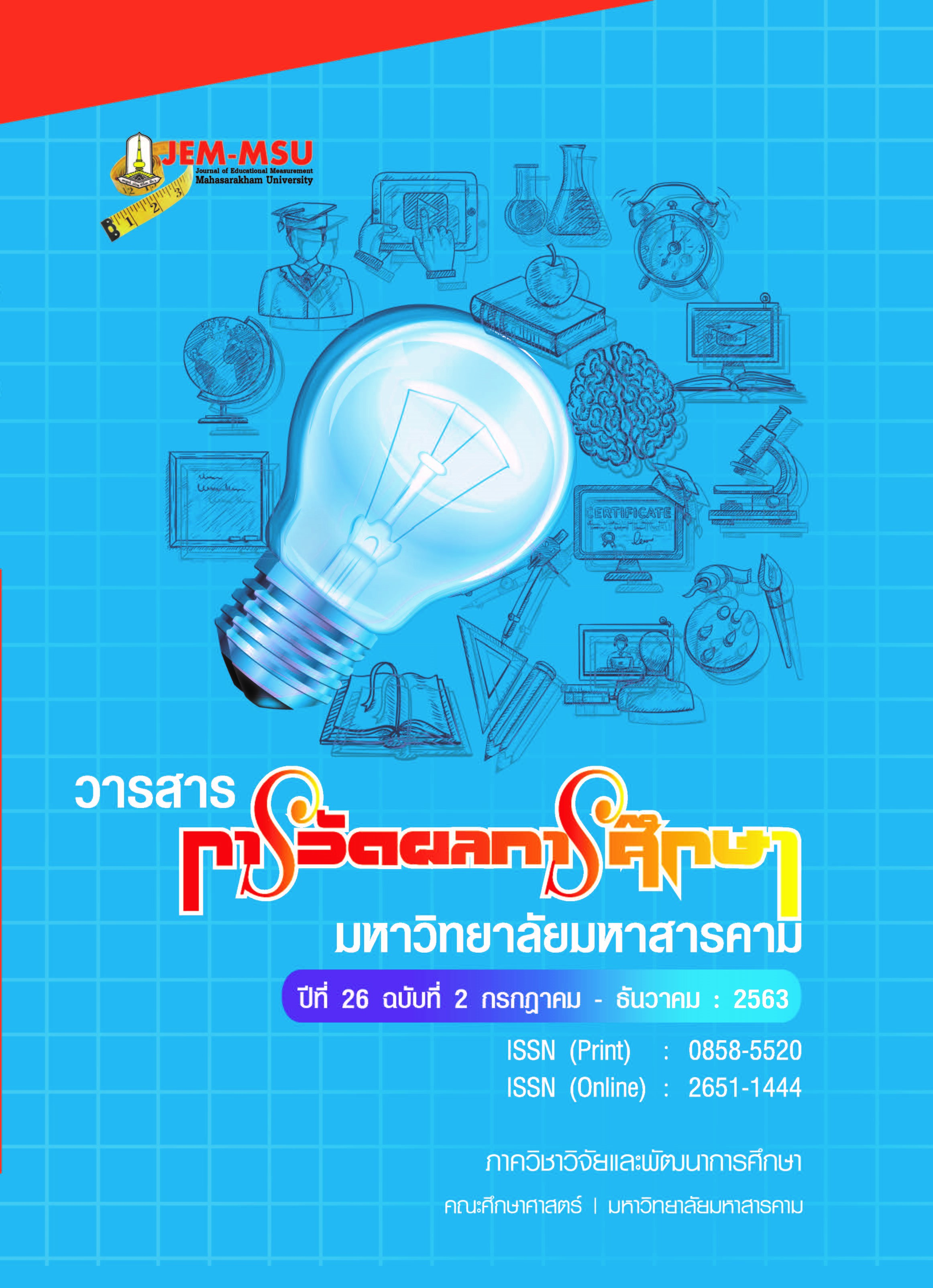A Model to Develop Dedicated Work Behaviors of Teachers in Schools under Bangkok Metropolitan Administration
Main Article Content
Abstract
This research was divided into two phases. Phase 1 aimed to examine the causal factors model of teachers’ dedicated work behavior under Bangkok Metropolitan Administration. The sample consisted of 400 school teachers under Bangkok Metropolitan Administration, obtained through stratified random sampling. The instruments of this research were 11 sets of summated rating scale with item total correlations (r) from .265 to .828 and coefficient alpha reliabilities from .687 to .942. The statistics for hypothesis testing were multiple regression and path analysis. The research results revealed that each of the 3 causal factors groups could predict more than 30 percent of the teachers’ dedicated work behaviors, and the model of teachers’ dedicated work behaviors were confirmed with empirical data. Phase 2 was an experimental research aiming to study the effectiveness of the Causal Factors of the Teachers’ Dedicated Work Development Program. The sample comprised 87 voluntary school teachers under Bangkok Metropolitan Administration. The research instrument was the Causal Factors of the Teachers’ Dedicated Work Development Program. The statistics for hypothesis testing were t-test and ANOVA with repeated measures. The research results indicated that the teachers who had been trained in the Causal Factors of Teachers’ Dedicated Work Development Program showed higher scores of trained characteristics and dedicated work behavior tendency than the teachers who had not been trained, and it was found that 2 weeks after training those results were still retained.
Article Details
The content and information contained in the published article in the Journal of Educational Measurement Mahasarakham University represent the opinions and responsibilities of the authors directly. The editorial board of the journal is not necessarily in agreement with or responsible for any of the content.
The articles, data, content, images, etc. that have been published in the Journal of Educational Measurement Mahasarakham University are copyrighted by the journal. If any individual or organization wishes to reproduce or perform any actions involving the entirety or any part of the content, they must obtain written permission from the Journal of Educational Measurement Mahasarakham University.
References
โกศล มีคุณ และ ณรงค์ เทียมเมฆ. (2545). ผลของการฝึกใช้เหตุผลเชิงจริยธรรมที่มีต่อจิตลักษณะและพฤติกรรมจริยธรรมของครู. ทุนอุดหนุนการวิจัย โครงการแม่บท : การวิจัยและพัฒนาระบบพฤติกรรมไทย, กรุงเทพฯ : สำนักงานคณะกรรมการวิจัยแห่งชาติ.
ดวงเดือน พันธุมนาวิน. (2538). ทฤษฎีต้นไม้จริยธรรม. กรุงเทพฯ: สถาบันบัณฑิตพัฒนบริหารศาสตร์.
ดวงเดือน พันธุมนาวิน. (2553). ผลสำเร็จของการพัฒนาพฤติกรรมครูคณิตศาสตร์ ด้วยการฝึกจิตลักษณะและทักษะแบบบูรณาการ: หลักฐานจากงานวิจัยสองขั้นตอน. วารสารจิตพฤติกรรมศาสตร์ : ระบบพฤติกรรมไทย, 7(2), 66-109.
ดุจเดือน พันธุมนาวิน, และอัมพร ม้าคะนอง. (2547). ปัจจัยเชิงเหตุและผลของพฤติกรรมการพัฒนานักเรียนของครูคณิตศาสตร์ในระดับมัธยมศึกษา. รายงานการวิจัย, กรุงเทพฯ : สำนักงานคณะกรรมการการวิจัยแห่งชาติ.
ดุจเดือน พันธุมนาวิน. (2550). การสังเคราะห์งานวิจัยเกี่ยวกับคุณธรรมจริยธรรมในประเทศไทยและต่างประเทศ. รายงานทุนอุดหนุนจากศูนย์ส่งเสริมและพัฒนาพลังแผ่นดินเชิงคุณธรบริหารและพัฒนาองค์ความรู้. (องค์การมหาชน).
นงลักษณ์ วิรัชชัย, และสุวิมล ว่องวาณิช. (2550). แนวทางการให้คำปรึกษาวิทยานิพนธ์. ศูนย์ตำราและเอกสารทางวิชาการ. กรุงเทพฯ: คณะครุศาสตร์ จุฬาลงกรณ์มหาวิทยาลัย.
เมธินี คุปพิทยานันท์. (2548). ประสิทธิผลของการฝึกแรงจูงใจใฝ่สัมฤทธิ์ เพื่อปลูกฝังและพัฒนาพฤติกรรมทันตสุขภาพเด็กนักเรียนประถมศึกษา. วารสารจิตพฤติกรรมศาสตร์: ระบบพฤติกรรมไทย, 2(1),111-148.
ศุภวดี บุญญวงศ์, และคณะ. (2552). ปัจจัยเชิงเหตุและผลของพฤติกรรมครูในกิจกรรมพัฒนาผู้เรียนเพื่อเสริมสร้างคุณลักษณะที่พึงประสงค์. รายงานการวิจัย ทุนสนับสนุนการวิจัยจากงบประมาณแผ่นดิน, มหาวิทยาลัยทักษิณ, สงขลา.
สำนักงานสภาพัฒนาการเศรษฐกิจและสังคมแห่งชาติ, สำนักนายกรัฐมนตรี. (2560). แผนพัฒนาเศรษฐกิจและสังคมแห่งชาติฉบับที่ 12 พ.ศ. 2560-2564.
ฤกษ์ชัย คุณูปการ. (2553). การวิจัยทางจิตพฤติกรรมศาสตร์เพื่อพัฒนาพฤติกรรมประชาธิปไตยของนักศึกษามหาวิทยาลัย. วารสารจิตพฤติกรรมศาสตร์: ระบบพฤติกรรมไทย, 7(1), 110-157.
Audrey Amrein-Beardsley. (2007). Recruiting Expert Teacher into Hard-to-Staff Schools. Phi Delta Kappa 89, 1(Sep 2007).
Faul, F., Erdfelder, E., Lang, A.-G., and Buchner, A. (2007). G*Power 3 : A flexible statistical power analysis program for the social, behavioral, and biomedical sciences. Behavior Research Methods, 39, 175-191.


